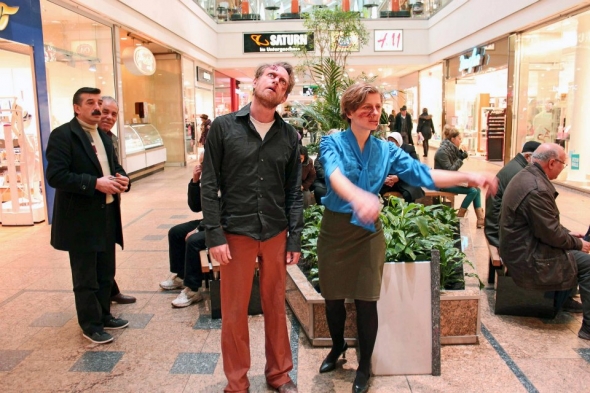MANIFESTO FOR ZOMBIE-COMMUNISM
In the initial formulation of the notion of Revolutionary Situation (in his article Mayovka of the Revolutionary Proletariat) Lenin describes two conditions for a Revolutionary Situation, which were later resumed as "the bottoms don't want and the tops cannot live in the old way". Later, Lenin adds one more condition: the readiness of the masses for revolutionary action. In his text "Left-Wing" Communism: An Infantile Disorder he even claims that for the victory of Revolution it is necessary that the majority of workers are ready to meet death in their struggle. The greatest of Lenin’s achievement was to proclaim, at some point, that the revolutionary situation is now and not somewhere in the future.
Let’s forget for a moment about the tops and the bottoms, and concentrate on these verbs: “don’t want”, “cannot”, “are ready” (to act, to meet the death). Here, we deal with unwillingness, impossibility, and mobilization. Living in the old way is not desirable any more, and it is not possible, and the one is ready for everything. That’s what I call despair.
The border between hope and despair is very subtle. There can be a moment where they are always indiscernible, but right after this moment – when THIS is not only undesirable, but impossible, and absolutely unbearable, - in brief, when hope slips, or rather leaps into despair – there is a point of no return. Only desperate are ready to die in this struggle – not because they hope for a better future, but because they cannot stay in the present. Desperate simply means that things cannot stay like this. And here is the difference – until there is hope, a true revolutionary action is getting postponed.
There are three types of hope:
- That things will get better (and therefore we should either patiently wait and do nothing, or even support the status quo – to prevent changes which can bring bad outcome);
- That things will get better if we struggle (that is, we can make the world better, improve it);
- That things will get worse (they are not that bad now, the future will give more trouble, a revolutionary situation will follow, we must get prepared to it, etc.);
The first kind of hope is conservative and reactionary, the second progressively reformist (and functions effectively, making а perfect balance between capitalism and social-democratic struggles), and the third one – messianic. Thus, operaists or accelerationists are confirmed that capitalism inevitably leads to a catastrophe, that finally things will get so bad, and this will be finally a revolutionary situation, which will give us a chance: capitalism will destroy itself, and we must either wait for this moment, or even approach it. The moment of the greatest catastrophe and the greatest danger is in the future (which means, our present might look not that nice, but is still, somehow, tolerablе – in comparison to, say, an ecological catastrophe which will happen in the nearest future, as it shown in recent film Interstellar by Christopher Nolan, and other Hollywood movies).
Catastrophic communism rejects all three kinds of hope. No, this situation will not miraculously get better, and we cannot improve it and make it more tolerable, since capitalism is fundamentally wrong (little improvements of the condition of the working class in Sweden are to be balanced with a hyper-exploitation in India, etc.), and it cannot get really worse because it is already the worst, there is no salvation. This is the situation of despair, or a revolutionary situation, when one cannot, do not want, and is ready for everything. Forget about the future, you are fighting not because you hope to improve your condition, but because this given condition cannot be tolerated. You act out of impossibility. A desperate can move mountains – it’s not hope which gives her this force, but anger, solitude, hunger, extreme unhappiness, pain, unbearableness of her desire or need.
One does not have hope, one is doomed, but this is so fundamentally and absolutely wrong and unjust, that one simply cannot stay in this hopeless and despair situation, he is urged here and now, this cannot be postponed.
As soon as we consider ourselves as living beings, we always have reason to postpone – once one is alive, there is hope (at least a miracle can happen). In contemporary vitalist biolopitical regime life is recognized as a sacred value, and Lenin’s idea of readiness for death for the revolutionary cause sounds almost criminal. Nothing, no political ideas and ideals can be as sacred as an individual human life, they say: there are always alternative ways of life and forms of life which are to be praised.
But what if we are not alive? Zombie is the one who is dead, who therefore does not have any hope, but still has a desire, and consciousness, or bodily feeling, or even a kind of instinct or inertia related to the fact that an extreme injustice of his situation cannot be tolerated – this is an ultimate despair. As already dead, he just cannot live, and that’s what, paradoxically, makes him an undead, or a living dead. His decomposing body is not individual any more, it does not belong to any person. А zombie does not have individual life, nothing to take care about, and yet he is not agree to rest, he still desires, and his impersonal body acts.
When we think about zombie apocalypse, we tend to identify ourselves with those who will survive (forgetting, for example, that in capitalism one survives at the expense of the other – isn’t this fact already absolutely unbearable?), but what if we are not among those happy survivors? What if we are already on the other side? Forget the hope: revolution starts in the hell.
Mute Books Orders
For Mute Books distribution contact Anagram Books
contact@anagrambooks.com
For online purchases visit anagrambooks.com







